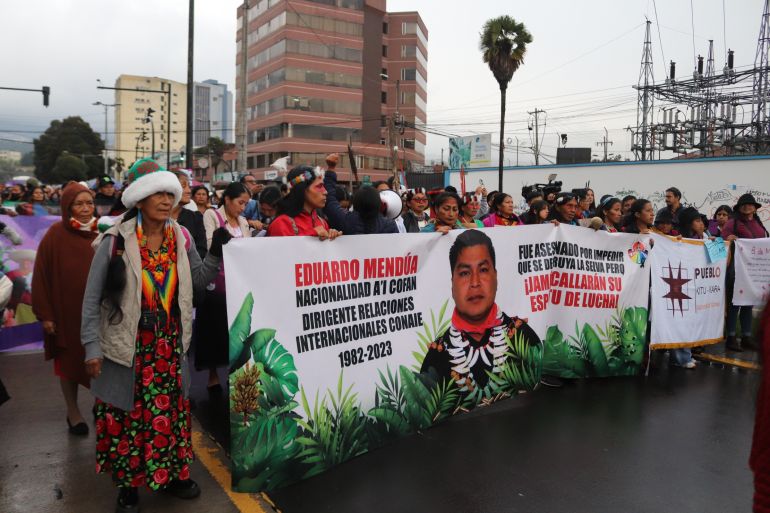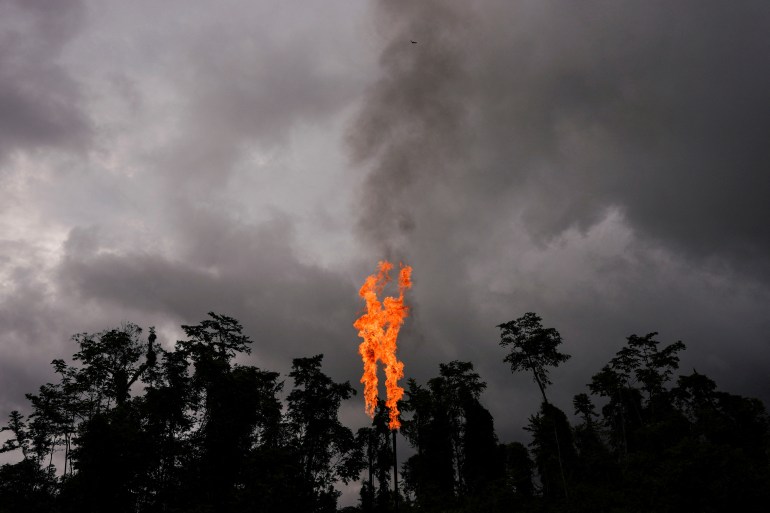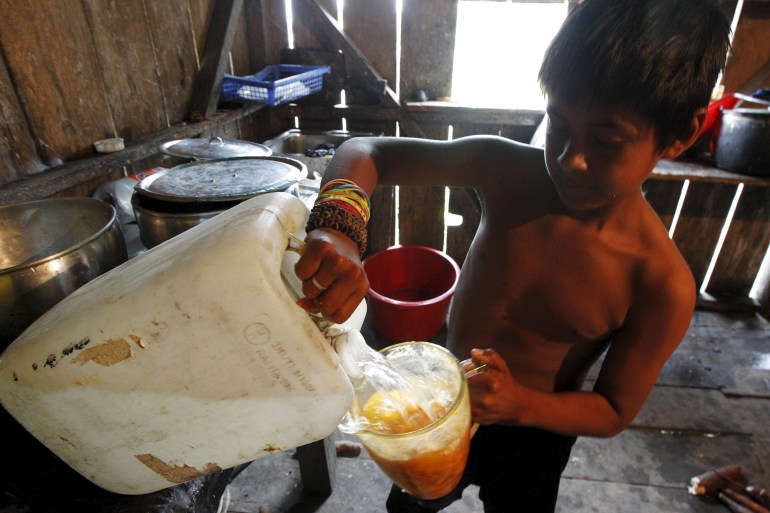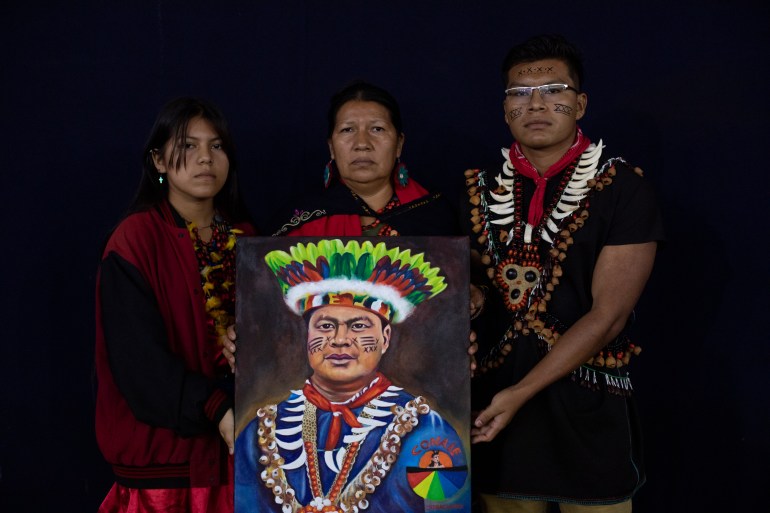Killing of Indigenous Ecuador anti-oil activist spurs questions
Eduardo Mendúa was shot outside his home, leading some to wonder about the role of the oil industry in his death.

Sucumbíos, Ecuador – It was a Sunday in late February, and Eduardo Mendúa was doing what he was famous for: organising against the oil drilling that had transformed his ancestral lands in Ecuador.
A member of the Indigenous Cofán people, Mendúa had seen pipelines and wells spring up throughout the rainforest his community called home. Oil spills had stained the land, and pollution had seeped into nearby waterways.
Keep reading
list of 4 itemsColombia, Ecuador work to protect Indigenous people from attacks
Ecuador opens investigation into explosives sent to news media
Ecuador: ‘Modern-day slaves’ seek justice in landmark trial
So Mendúa joined a tradition of Cofán activism. He campaigned against efforts by the state-owned oil company Petroecuador to expand into Cofán territory and became a leader for Ecuador’s largest Indigenous rights organisation, the Confederation of Indigenous Nationalities of Ecuador (CONAIE).
His Facebook message around midday on February 26 was in keeping with his activism. In a fiery post, he demanded that Petroecuador stop its expansion into Cofán lands.
“We are not about to cede an inch of our territory so that the oil companies destroy the spiritual beings and invisible people of our forests, rivers, lagoons, sacred places, ravines, medicine and trees,” he wrote.
But it would be the last message Mendúa ever sent to his followers. Hours later, Mendúa was dead. And those closest to him wonder if his anti-oil activism led to his assassination.

Fighting ‘forced infiltration’
Until the end of his life, Mendúa lived in the northern town of Dureno, on the banks of the Aguarico River, a name which translates to “rich water”.
The community, composed of around 750 inhabitants, sits within 9,571 hectares (23,650 acres) of primary forest, undisturbed by human industry.
But that wilderness was increasingly under threat. In 2022, the Ecuadorian government authorised the construction of 30 new oil wells — a decision made without the appropriate community consultation, according to critics.
Albeiro Mendúa, Eduardo’s brother, told Al Jazeera his brother had refused to accept the “forced infiltration” of oil companies in the territory and fought because he “wanted to end the injustices the community faced”.
Since the emergence of oil in the region, pollution in the river has led to a decline in biodiversity, clean water and tourism.
The Cofán and other Indigenous peoples also faced a public health crisis, with increasing rates of cancer, miscarriages, childhood leukaemia and birth defects.
“People are dying with unknown diseases,” said Albeiro. “The oil company is causing the disappearance of our population.”

‘War between brothers’
When Mendúa learned of the proposal to build new oil wells nearby, he and other campaigners formed a blockade at the entrance of the proposed drilling site that lasted several months.
The protesters established a permanent camp, preventing personnel and machinery from moving through Cofán territory.
On January 9, members of Ecuador’s Armed Forces and the National Police tried to evacuate them, resulting in a violent confrontation between members of the community that left six people seriously injured.
Mendúa recorded a statement in response, blaming the national government and Petroecuador for creating a “war between brothers”.
The oil drilling in the region, he explained, had driven a wedge through the community of Dureno. Some saw economic opportunity in the development. Others feared continued pollution.
“I want to make clear to the public and the international community that I truly reject these violent acts against and between brothers,” he said. “I call on the government to please stop the violence it has caused.”
Mendúa had hoped to file a lawsuit against Petroecuador and the government on the grounds that they violated the Indigenous community’s right to prior, informed consultation about the project.
But then came February 26. Police said five individuals gunned Mendúa down in his family garden.
Three suspects were arrested, including the driver of a motorised canoe allegedly used to flee the scene, who remains in custody. The other two have been released.
The Indigenous Cofán are known as a water people, and the canoe is their main form of transportation.

Disproportionate attacks on Indigenous advocates
Officials have not confirmed the motive behind the attack. But CONAIE and other non-governmental organisations, along with Mendúa’s family members, allege Petroecuador is responsible for the conditions that led to his murder.
“We hold the Petroecuador company responsible for the loss of our partner who leaves his children as orphans,” the Confederation of Indigenous Nationalities of the Ecuadorian Amazon (CONFENIAE) wrote on social media.
Likewise, CONAIE took to Twitter to accuse Petroecuador of being “directly” tied to the assassination.
“In Dureno, for more than eight years, there has been pressure, chaos and division exerted by Petroecuador,” said Leonidas Iza Salazar, president of CONAIE, in a press conference.
Petroecuador did not respond to multiple requests for comment. But in the wake of Mendúa’s death, on February 26, its official Twitter account reposted a message from Ecuador’s President Guillermo Lasso.
“The Government of Ecuador expresses its solidarity with the family of Eduardo Mendúa and with CONAIE,” Lasso’s message read. “This crime will not go unpunished.”
Al Jazeera also tried to reach several government officials in Ecuador’s environment and energy ministries but did not receive a response by the time of publication.
But in a report last year about violence against environmental activists, the NGO Global Witness found that over a quarter of deadly attacks in 2021 were linked to resource extraction, hydroelectric dams and infrastructure projects.
It also noted that Indigenous activists often bore the brunt of this violence. More than 40 percent of the deadly attacks it documented were against Indigenous peoples, with Latin America facing particularly high rates of violence.
Ecuador’s Alliance for Human Rights echoed those findings in its own 2021 report [PDF]. It found that 449 human rights defenders and environmentalists had faced “intimidation, threats, harassment, prosecution, persecution and even murder” over the past 10 years.
“It causes us grave concern that the majority of the documented cases of these violations are committed principally by the armed forces, national police and public officials,” the report explained.

Alberto Acosta, Ecuador’s former minister of energy and mining, was president of Ecuador’s Constituent Assembly when it enshrined the “rights of nature” in its constitution in 2008.
Those rights included protections against environmental destruction and safeguards for communities that rely on natural resources. But Acosta told Al Jazeera that the concerns of Indigenous peoples continue to be “trampled on” when it comes to oil and mining projects.
“Amazonian communities continue to be criminalised, repressed, persecuted, disqualified and assassinated,” said Acosta. “That, without a doubt, forged Eduardo’s character and commitment to defend the territory of his community.”
Ultimately, Mendúa’s brother Albeiro believes the assassination will have a chilling effect on Indigenous activism: “People live in fear of leaving their homes, of hunting or fishing. We are scared to go out.”
“There is currently no peace in Dureno,” he explained. “We fear that if they have killed a leader, they are capable of anything.”